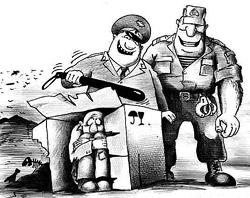If the RA parliament approves the convention on struggling against corruption made in New York in 2003, it is expected that Armenia will become free of unfair, corrupted and dishonest officials that have robbed the country and took bribery, thus Armenia will become a country with low level of corruption.
Yesterday the deputies were asking each other “whether they wanted to leave in a country like that”, and after thinking for some time, they said that they would answer to that question later. Even some of them thought their colleagues were kidding and asked, “What did you say?”, and following that question their colleagues said that it was more than one our the other colleagues sitting in the parliamentary hall were kidding too.
In other words, yesterday the parliament was discussing the issue of approving the anti-corruption convention made in New York in 2003, which would enable Armenia become a participant country of the UN anti-corruption convention. As for becoming a member of the mentioned convention, as the justice minister, David Harutyunyan, assured the foreign affairs minister, Vardan Oskanyan, it means that thus the legal basement of anti-corruption international activities will be strengthened and will help to struggle against corruption internationally. For instance, a clause in the convention concerns the appearance of high rank officials, which writes that each participant country should encourage their officials in fairness, honesty and non-corruption. If the officials violate the principles after being encouraged in the abovementioned things, they should be punished on the basis of the law. The deputies thought the mentioned provisions of the convention were very simple and thus they suggested the UN experts “to come to Armenia and learn those things from Armenians”. “We know those things very well and knew that before too”, said some deputies speaking about the conclusions of the justice minister and the head of the Constitutional Court, writing that those provisions of the convention did not contradict the provisions of the Constitution since those things were written in the Constitution too.
The convention writes details as well as on what is considered as a case of bribery. The mentioned provisions don’t contain anything new either. For instance, a direct or indirect promise that would encourage to do something instead is considered corruption. Taking money for doing something instead is considered as a case of corruption too.
The convention writes that those officials that are not fair and have taken bribe should be replaced, and those who are fair and have discovered such cases should be encouraged instead. By the way, the convention writes as well as about collaborating with the police and how they may help the police to discover those cases of bribery easily. The deputies didn’t like this provision most. “In fact, they want to encourage some people to give them information, discover such cases. What is this?” said one of the deputies and added that our nation did not have such traditions and he was going to explain his colleagues that our laws were better since they don’t encourage people to discover such cases and collaborate with the police.
Viktor Dallakyan argued that he didn’t understand how a state official can discover his own bribery: “How can they struggle against corruption if they are corrupted too?” said V. Dallakyan bringing the example of the general prosecutor and his luxury cars and added, “No, they can’t”. The latter spoke as well as about the announcements of the State Department and the World Bank saying that corruption is much developed in Armenia and even it is developed in the highest levels and said, “What are we discussing now? The roots of corruption lie too deep and the civil world has always struggled to cut it down; there are several tools to do that such as specific traditions, an adequate legal environment, strict law and registration of the property and expenses of officials”. Otherwise, they may register their properties in the name of their wives, children and relatives, which doesn’t stop those things and corruption stays widespread in the country.
P.S. The parliament is going to discuss the convention today too. By the way, yesterday we asked the prime minister that being the head of the executive power how would he select officers and what criteria he thought would describe fairness, to which he replied, “Each convention has its specific tools too. If the mentioned tools are effective, we will use those tools”.

